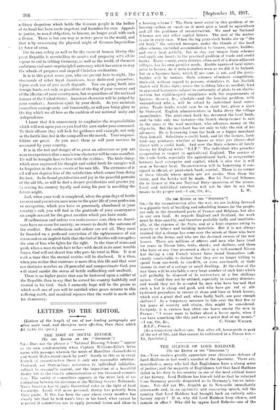tTo see Eorroa or TUE "ScrcrATon."1 Sin,—In the reconstruction after
the war, we aro looking forward to a gigantic task of building and rebuilding houses for the people, not only in the devastated parts of France and Belgium. but ales in our own land. As regards England and Scotland, the work must be done quickly, and therefore probably badly and inartistic- ally, at the expense of the State, and at a huge expense owing to scarcity of labour and building materials. But it is not always realised that a change has come over the minds of those who have served in the Army, and who are the destined owners of the new houses. There are millions of officers and men who have lived for years in Nissen huts, tents, shacks, and shelters, and those who have at nay time possessed a share in a well-warmed Nissen but during a cold French winter have found themselves suffi- ciently comfortable to declare that they are no longer wining to spend from one-tenth to one-fifth, or event one-fourth, of their income in rent of a cottage or small dwelling. At the close of Cho war there will be available a very large number of such huts which will probably be disposes' of to contenders at a few shillings apiece. Could they not be utilized, especially in country districts. and would they not be accepted by men who have learned that snub a but is cheap and good, and who have got rid of old- fashioned prejudices in favour of stone and Base or brick houses, which cost a great deal and, when badly built, are poor enough shelters ? As a temporary measure to tide over the first five or ten years of scarcity and strain, this might be considered. Certainly, it is curious how often one heart; among the men in France: " I never want to bother about a house again, when I can have something like this and save a great deal of my money." —1 am, Sir, dc.,C. STUART WALLACE.
B.E.P., France.
[As a temporary shelter—yes. But, after all, house-pride is part of the art of life, and that cannot be cultivated in a Nissen hut.— Es. Spectator.] . ,


























 Previous page
Previous page